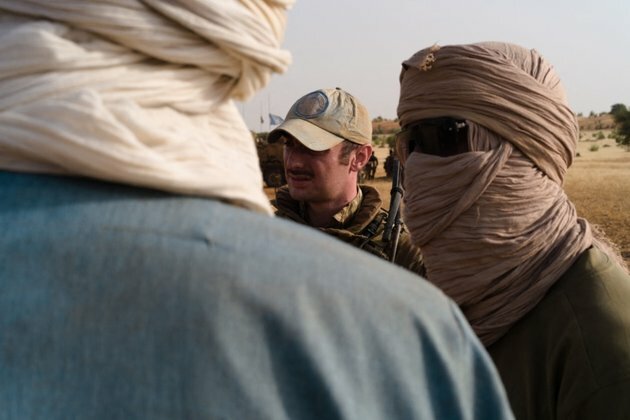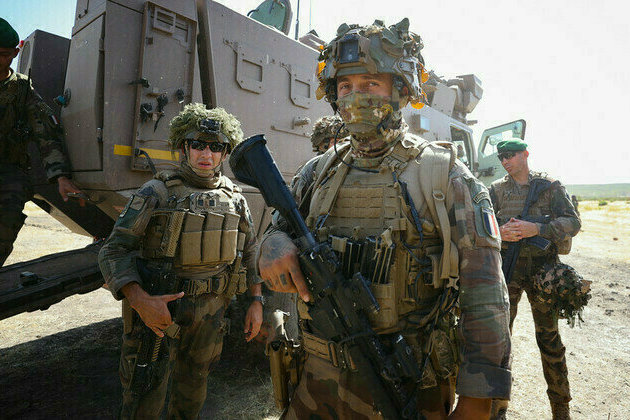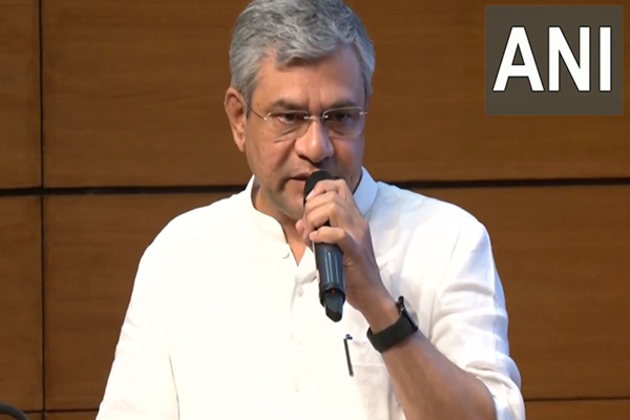Mali Tour Guides Transformed Into Battlefield Interpreters
Voice of America
26 Nov 2021, 11:35 GMT+10

MÉNAKA, MALI - Aboubacar shared tea and sugary snacks with his colleagues gathered on a mat at a United Nations camp in battle-scarred Mali.
He speaks plainly but with a hint of irony about his transformation from a tour guide with 14 years of experience, until 2014 when he became a front-line military interpreter.
After the war upended his business, he sought work as a translator for the British contingent of the U.N.'s mission in Mali, MINUSMA.
'Before we were protecting the white tourists, but now it's the whites who protect us in the bush,' he said with a smile.
There are dozens of others like him who work with the British blue helmets every day, speaking Tamasheq, Songhai or Arabic.
He pulled a scarf over his nose, donned dark glasses and became almost unrecognizable.
'It's very different from what we did before, but the goal is the same: to show the country to foreigners,' said Aboubacar, an alias to protect him and his colleagues.
There were numerous tour guides in the region during the golden age of tourism in the 1990s and 2000s.
They took visitors to see the famed mosque at Djenne, the manuscripts of Timbuktu and to bathe in the Banfora waterfalls in Burkina Faso, among other places.
But they lost their livelihoods in the 2010s when separatist movements and jihadi groups unleashed a cycle of deadly violence that made the region, rich in heritage and natural beauty, too dangerous for tourists.
Most did not find other work.
From tourists to troops
After several years of unemployment, Aboubacar followed a friend's advice and used the English he learned guiding tourists to approach the U.N. He flew to their base at Gao, which is home to the peacekeepers as well as French forces.
Now he is an intermediary with the local population, dressed in a large army jacket and weaving in and out of the bush in armored vehicles.
He makes introductions, explains the armed foreigners' mandate and the significance of their U.N. blue helmets.
A day later, under a leafy tree offering the only shade around, Aboubacar's colleague Moussa approached armed men whose firearms permits the force wanted to check.
Jovial and tactile, he held the shoulders of one member of the armed group, giving the impression more of a gathering of old friends than a tense encounter colored by suspicion.
Essential to UN's job
Having the translators 'is absolutely central for us to do our job,' said Pierre Russell of the British Army Long Range Reconnaissance Group.
'We go out and speak to the local population and without their ability to communicate in up to five or six different languages we wouldn't be able to do our job.'
The total number of interpreters working with foreign forces is unknown. The dozen who spoke to AFP described a translator corps several hundred in number.
Back at the U.N. base, there were lively discussions.
There is nostalgia for a simpler era, when 'life was good' and whites came with cameras in hand.
There are some in Mali who have criticized the intervention of the U.N. and France in a country where the presence of foreign forces has previously proved controversial.
'Obviously we see things, but we keep our opinions to ourselves,' Moussa said.
'Feed our families'
There is also fear that once the foreign forces leave, the Malian interpreters could face a similar fate to those who supported Western forces in Afghanistan and were suddenly left to their fate after the Taliban takeover.
In the Sahel, 'either we resolve the problem and are congratulated ... or the jihadists will still be there after the departure of the foreigners and we'll have to leave,' Youssouf said, wistfully.
He now runs a small business employing interpreters who served with the British blue helmets.
The mood turns when the interpreters recount how some of their number have been accused of being traitors.
Some hide their work from their families, allowing them to believe they simply work in the U.N. camps as contractors like many other local people.
'We have to feed our families,' Youssouf said.
 Share
Share
 Tweet
Tweet
 Share
Share
 Flip
Flip
 Email
Email
Watch latest videos
Subscribe and Follow
Get a daily dose of Broadcast Communications news through our daily email, its complimentary and keeps you fully up to date with world and business news as well.
News RELEASES
Publish news of your business, community or sports group, personnel appointments, major event and more by submitting a news release to Broadcast Communications.
More InformationBusiness
SectionStandard and Poor's 500 and and Nasdaq Composite close at record highs
NEW YORK, New York -U.S. stock markets closed with broad gains on Thursday, led by strong performances in U.S. tech stocks, while European...
Persson family steps up H&M share purchases, sparks buyout talk
LONDON/STOCKHOLM: The Persson family is ramping up its investment in the H&M fashion empire, fueling renewed speculation about a potential...
L'Oreal to buy Color Wow, boosts premium haircare portfolio
PARIS, France: L'Oréal is making a fresh play in the booming premium haircare segment with a new acquisition. The French beauty conglomerate...
Robinhood launches stock tokens for EU investors, adds OpenAI
MENLO PARK, California: Robinhood is giving European investors a new way to tap into America's most prominent tech names — without...
Wall Street diverges, but techs advance Wednesday
NEW YORK, New York - U.S. stocks diverged on Wednesday for the second day in a row. The Standard and Poor's 500 hit a new all-time...
Greenback slides amid tax bill fears, trade deal uncertainty
NEW YORK CITY, New York: The U.S. dollar continues to lose ground, weighed down by growing concerns over Washington's fiscal outlook...
Sectors - Broadcasting
SectionSBA participates in World News Media Conference 2025 in Poland
SHARJAH, 7th May, 2025 (WAM) -- The Sharjah Broadcasting Authority (SBA) recently took part in the 76th World News Media Congress,...
France returns military base to Senegal
Paris is withdrawing its troops after the African country scrapped a decades-old defense agreement France has handed over a military...
"Landmark day for India's efforts to encourage sporting talent": New National Sports Policy 2025 approval
New Delhi [India], July 1 (ANI): On the occasion of the approval of the new 'Khelo Bharat Niti 2025', Prime Minister Narendra Modi...
Indian Institute of Creative Technologies begins admissions for Animation, Visual Effects, Gaming, in August
Mumbai (Maharashtra) [India], July 1 (ANI): The Indian Institute of Creative Technologies (IICT) opens admissions for its first batch...
Cabinet approves Research and Development and Innovation scheme with corpus of Rs 1 lakh crore to boost strategic, sunrise domains
New Delhi [India], July 1 (ANI): In a significant step to bolster India's research and innovation ecosystem, the Union Cabinet on Tuesday...
Georgia Risks EU Sanctions; Ukraine Hits Roadblocks In NATO, EU Bids
Welcome to Wider Europe, RFE/RL's newsletter focusing on the key issues concerning the European Union, NATO, and other institutions...













